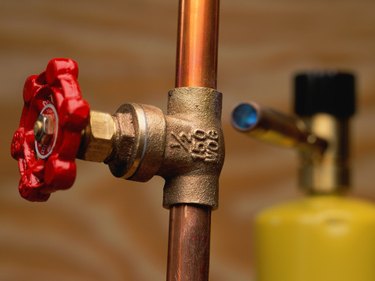Things You'll Need
Propane torch
Igniter
Channel lock pliers (2)
Flame shield

Plumbers join copper pipe with a torch and soldering paste in a process called sweating pipe. The plumber applies the solder to the juncture of the pipe and fitting, making it watertight and permanent. To make repairs, it is sometimes necessary to take the joint apart. This process is known as unsweating pipe.
Step 1
Place the flame shield between the copper pipe joint and any flammable material close to the joint.
Video of the Day
Step 2
Open the valve on the propane torch just enough to hear the gas escaping. Bring the igniter close to the torch nozzle and squeeze the handle to make a spark. The torch will ignite.
Step 3
Heat the copper pipe fitting with the torch. The brighter blue portion of the flame that comes to a point within the flame is the hottest part of the flame. Heat the fitting until you see the silver-colored solder begin to melt. Heat the fitting for another 30 seconds so it stays hot after you move the torch away.
Step 4
Grasp the fitting with one of the pliers and the pipe with the other; use care not to crush the fitting or the pipe. Turn the fitting with the pliers and pull it off the pipe.
Tip
It may take more than one try to get the fitting off. Often the pliers will pull heat from the fitting, causing the solder to harden again.
Warning
When you set the torch down to pick up the pliers, make sure the flame is pointed in a safe direction away from any flammable materials.
Video of the Day